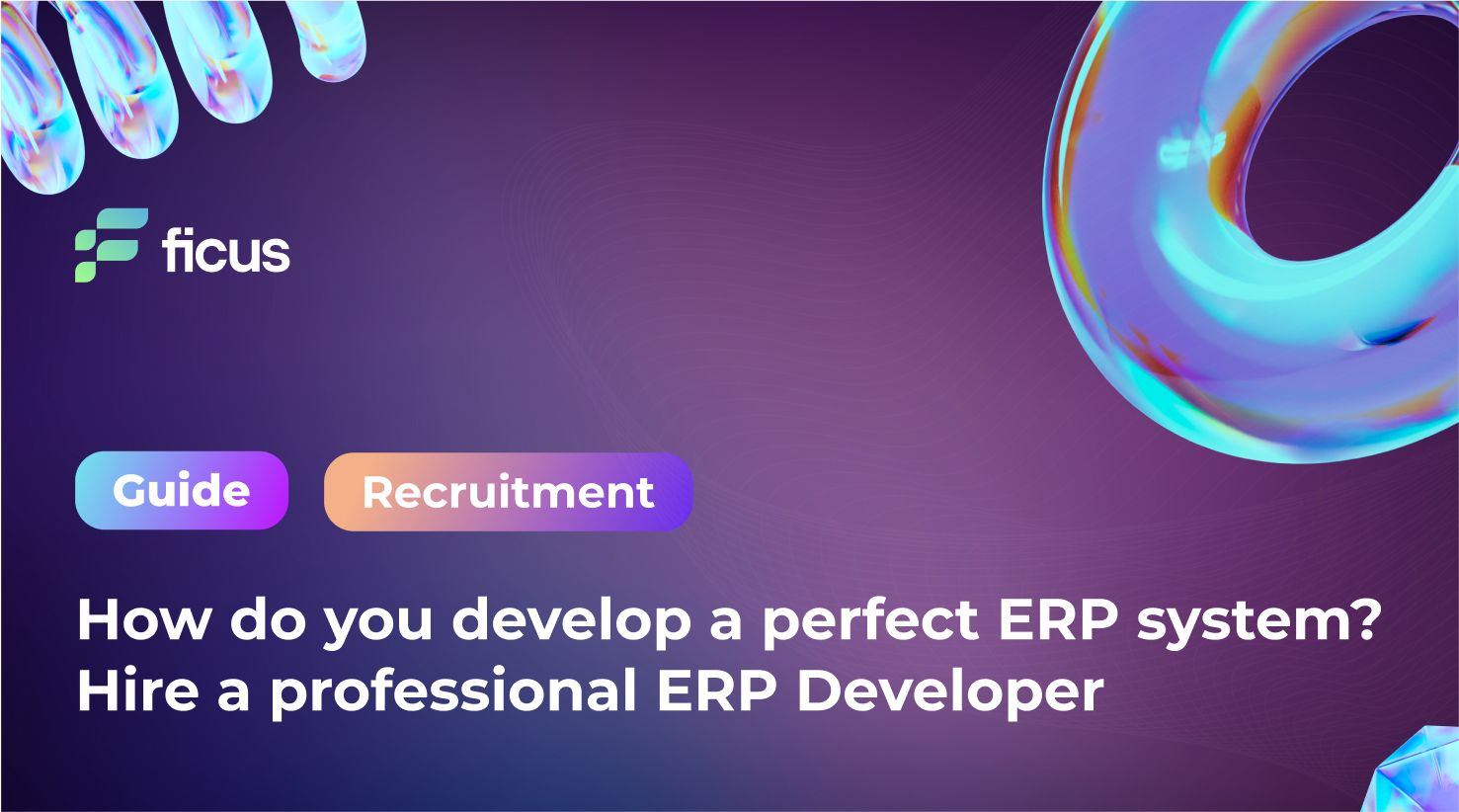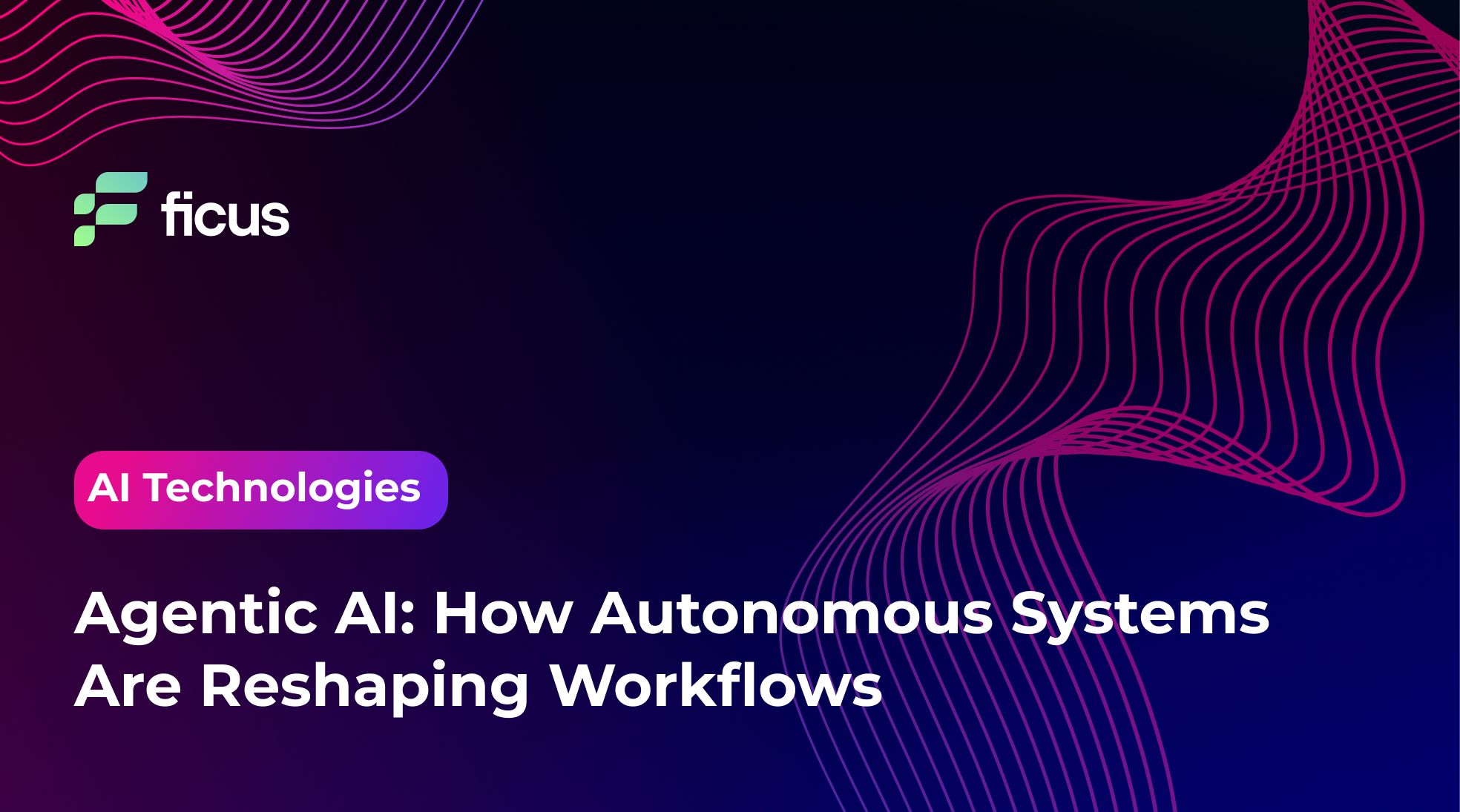Managing complex business operations requires a robust strategy to drive efficiency and growth. Central to this challenge is developing ERP systems that seamlessly integrate and optimize various business processes. The expertise of ERP system developers becomes crucial in crafting solutions that meet current needs and are scalable for future challenges. Engaging the right talent to develop ERP systems is pivotal to achieving operational excellence. By securing proficient ERP system developers, businesses can enhance their process management, data analysis, and overall operational agility, positioning themselves for sustained success in a digital-first economy.
- ERP excellence hinges on adept ERP developers and specialists.
- Ficus Technologies offers tailored ERP solutions for efficiency and productivity.
- Our ERP developers and specialists ensure ongoing support and growth.
What Is the Development of ERP?
Developing an ERP system involves constructing software that unifies various business functions into one platform. An ERP system developer focuses on creating modules for finance, HR, and more to boost operational efficiency. When you hire an ERP developer, you ensure your system standardizes and integrates processes across departments, aiding in automation and strategic decision-making. Developing an ERP system is about enhancing data management and operational coherence.

Why Do You Need ERP System Development?
Developing an ERP system is essential for businesses aiming to reduce costs, enhance efficiency, and facilitate growth. By deciding to develop an ERP system, you’re not just optimizing current operations but also strategically planning for future expansion. Hiring an ERP developer is a step towards harnessing the full benefits of enterprise resource planning, ensuring your business is well-equipped for both present and future challenges.
- Business process automation
Business process automation through developing an ERP system transforms efficiency, allowing tasks to be executed rapidly and with fewer errors. By choosing to develop an ERP system, repetitive tasks are minimized, freeing up resources for strategic activities. Automation ensures that ERP system developers provide solutions that significantly reduce duplication, rework, and mistakes, enabling businesses to achieve more in less time.
- Data-driven decisions
Data-driven decisions become the norm when you develop an ERP system, offering a comprehensive view of operations, trends, and potential issues. An ERP system developer crafts custom solutions, enabling data-driven strategies and incorporating features like lead analysis for sales, enhancing decision-making capabilities across the board. Hiring an ERP developer equips businesses with the tools to navigate through data precisely.
- Security of customer data
The development of an ERP system is crucial for the security of customer data, providing advanced protection against cyber threats. An ERP system developer integrates sophisticated encryption, authentication, and access controls, ensuring data integrity and security. Businesses prioritizing customer data security benefit significantly from developing ERP systems and safeguarding sensitive information effectively.
- Improved collaboration
Improved collaboration is a benefit of developing an ERP system, uniting departments and teams within a digital ecosystem for seamless communication. An ERP system developer enables this interconnectedness, fostering a collaborative environment where insights and ideas are freely exchanged, enhancing decision-making and project management.
- Regulatory compliance
Regulatory compliance is seamlessly managed with an ERP system, automatically updating the latest regulations. Developing an ERP system means embedding compliance into the operational fabric, relieving businesses of constant regulatory monitoring. This aspect of ERP system development ensures companies stay ahead of compliance requirements effortlessly.
- Scalability and flexibility
Scalability and flexibility are inherent in custom ERP system development, smoothly accommodating business growth or contraction. ERP system developers create adaptable platforms that evolve with your business, efficiently managing production, services, or inventory changes. Hiring an ERP developer is a strategic move towards ensuring your business remains agile and responsive to market demands.
- Boosting customer experience
Boosting customer experience significantly benefits from developing an ERP system, enabling personalized interactions based on detailed customer insights. ERP system developers focus on solutions that improve management and support communications, ensuring customer needs are met promptly and accurately. Through ERP system development, businesses enhance their understanding of customer behaviors, elevating the overall customer experience.
Who is an ERP Developer?
An ERP system developer is a professional developing ERP solutions that streamline a company’s operations. They play a crucial role in developing ERP system platforms that integrate business processes such as finance and human resources into a cohesive system. Businesses looking to optimize operations and facilitate informed decisions often hire ERP developer experts, recognizing their expertise in enhancing efficiency and reducing costs through tailored ERP solutions.
Basic skills and expertise for ERP developers
An ERP system developer must possess unique skills to excel in developing ERP system solutions. Whether you aim to develop ERP system platforms or hire ERP developer talent, understanding these foundational abilities is crucial. This segment explores the essential competencies required for ERP development success.
- Technical skills
Mastery in developing ERP systems necessitates diverse technical proficiencies, notably in SQL for database management, Java, C#, and Python for programming. An adept ERP system developer is well-versed in database systems like MySQL and Oracle and deeply understands ERP platforms such as SAP and Microsoft Dynamics. Their ability to integrate ERP systems with other applications and APIs amplifies the functionality, showcasing the technical backbone necessary to develop ERP system solutions efficiently.
- Communication skills
Effective communication is paramount for an ERP system developer, bridging the gap between technical and non-technical stakeholders. The ability to articulate complex ERP system functionalities in understandable terms ensures clarity and fosters collaboration. Developers proficient in these skills can better understand requirements, explain system capabilities, and facilitate a smoother ERP system development process.
- Project management skills
ERP system developers excel in project management by orchestrating timelines, resources, and team dynamics to ensure timely and within-budget ERP system development. These skills enable developers to navigate project complexities, prioritize tasks, and lead teams towards successful implementations. Effective project management is essential for those looking to hire ERP developer professionals who can drive projects to completion.
- Problem-solving skills
A core competency of ERP system developers is their ability to tackle challenges during ERP system development. From diagnosing system issues to optimizing processes, their problem-solving prowess ensures that ERP solutions are functional and aligned with business objectives. This skill is crucial for developers who customize and enhance ERP systems to meet unique organizational needs.
- Human resources skills
ERP system developers integrate HR functionalities into ERP solutions, necessitating a thorough understanding of human resources processes. These skills are vital for developing ERP systems that support talent management, payroll, and employee engagement strategies, thereby contributing to streamlined HR operations.
- Financial management skills
Proficiency in financial management is crucial for ERP system developers who integrate accounting and financial operations into ERP systems. This expertise allows for the creation of robust financial modules, aiding organizations in budgeting, forecasting, and reporting, thereby enhancing financial visibility and decision-making capabilities within the ERP platform.
- Legacy systems skills
An adept ERP system developer must navigate the complexities of legacy systems, ensuring smooth data migration and system integration. These skills are pivotal when developing ERP systems requiring seamless coexistence with or replacing older systems, ensuring business continuity and data integrity.
- Technical lead skills
Leading an ERP system development project demands a unique blend of technical prowess and leadership qualities. A technical lead guides the development team through complex technical challenges, making strategic decisions that influence the project’s success. Their role is critical in setting technical standards, mentoring junior developers, and ensuring the ERP solution meets the project’s objectives.
- Quality assurance skills
ERP system developers play a crucial role in quality assurance, implementing testing strategies to ensure the ERP system operates flawlessly. Their expertise in automated and manual testing ensures the system is reliable, user-friendly, and free from defects, underscoring the importance of quality assurance in ERP system development.
Ready to enhance your ERP system? Wondering how Ficus Technologies can assist?
Contact Us6 Steps to Hire ERP Developers
Following a structured process is essential to successfully develop ERP system solutions tailored to your project’s needs. This guide presents six key steps to hiring ERP developer talent capable of developing ERP system projects. By adhering to these steps, organizations can engage ERP system developer experts who can customize and enhance the effectiveness of their ERP system initiatives.
Define Your ERP Project Requirements
Before you hire ERP developer talent, clearly outline your ERP system project’s scope and requirements. Determine the functionalities, necessary customizations, and integration points to ensure the ERP system aligns with your business processes. This preparation is the foundation for developing an ERP system, guiding you to select ERP system developers with the precise expertise your project demands, ensuring a tailored fit to your organizational needs.
Source Candidates from Diverse Channels
To develop an ERP system effectively, source ERP system developer candidates from a mix of online job boards, professional networks, and referrals. This strategy broadens your candidate pool, enhancing your chances of finding the right talent for developing ERP systems. Diverse sourcing is pivotal to attracting skilled ERP developers who can bring innovative solutions and robust skills to your project.
Evaluate Technical Proficiency
Technical assessment is paramount when you aim to hire ERP developer candidates. Reviewing their portfolio for relevant ERP system development experiences and conducting rigorous technical tests confirms their capability to develop ERP systems efficiently. This evaluation process helps identify developers with the essential programming skills and problem-solving abilities needed for complex ERP project requirements.
Assess ERP Project Experience
Understanding candidates’ past ERP system development involvement is vital. Discuss challenges they’ve faced, their experience with customization, and integration skills. This assessment helps ensure the ERP developers you hire are adept at navigating the complexities of developing ERP systems, bringing valuable experience and insight to your project and enhancing its chances for success.
Evaluate Cultural Fit and Teamwork
For successful ERP system development, it’s essential to consider cultural fit and teamwork ability. Since developing ERP systems requires collaboration across departments, ensuring candidates mesh well with your company culture and work effectively in team settings is crucial. This alignment supports a productive environment conducive to the successful completion of your ERP project.
Conduct In-Depth Interviews
In-depth interviews are key to identifying candidates who are technically proficient and passionate about your ERP project. Assess their problem-solving abilities, communication skills, and enthusiasm for developing ERP systems. This final step helps confirm that the ERP developer you select fully aligns with your project goals and is committed to contributing positively to the development process.
Where to Hire ERP Developers
In developing ERP systems, identifying optimal locations to hire ERP developers is paramount. Your choice significantly influences your project’s direction, quality, and financial outlay. Consider the following avenues:
- In-House Recruitment: Directly hire ERP developers for comprehensive involvement in developing ERP systems, ensuring alignment with ongoing needs.
- Dedicated Development Agencies: These entities are proficient in ERP system development, boasting seasoned teams ready to tackle your project efficiently.
- Freelance Platforms: Platforms like Upwork offer a diverse pool of ERP developers for project-specific engagements, demanding diligent candidate evaluation.
- Job Boards and Websites: Utilize platforms such as LinkedIn to cast a wide net in your search for ERP system developers.
- Professional Networks and Referrals: Tap into your network for referrals to ERP developers with proven track records.
- Online Developer Communities: Engage with ERP system developers in forums where they share expertise and collaborate.
- Recruitment Agencies: Specialized firms can streamline the search, presenting candidates adept in ERP system development.
Selecting the right source to hire ERP developers can drastically influence the success of your ERP system development efforts, blending expertise with your specific organizational dynamics.
Final Thoughts
Developing an ERP system requires meticulous planning, strategic hiring, and the engagement of experienced ERP developers. These professionals ensure that the ERP system integrates various business processes, enhancing operational efficiency and facilitating data-driven decision-making. The success of developing an ERP system hinges on the ability to tailor the system to meet the specific needs of a business, ensuring scalability and flexibility for future growth. By focusing on the skills and expertise of ERP developers, businesses can develop ERP systems that not only streamline current processes but are also robust enough to adapt to future challenges.
Ficus Technologies specializes in assisting businesses to develop ERP systems tailored to their unique operational needs. Our extensive experience developing ERP systems allows us to provide solutions that increase operational efficiency and improve strategic decision-making.
The best technology for developing an ERP system depends on a variety of factors, including business requirements, scalability, and flexibility. However, technologies such as Java, .NET, and Python are often chosen for ERP development due to their reliability, scalability, and wide support community. Java is known for its portability across platforms, .NET for its seamless integration with various Microsoft products, and Python for its simplicity and efficiency. In addition, cloud solutions such as AWS and Azure offer scalable and flexible platforms that can support ERP systems. Ultimately, the choice should be based on the organization’s specific needs and strategic goals.
Not every business needs an ERP system, as the need for one largely depends on the business’s size, complexity, and specific needs. Small companies with simple operations can get by with simpler solutions. However, as the business grows, the complexity of managing various processes such as finance, HR, inventory, and customer relations increases. An ERP system becomes an invaluable tool for integrating these processes, increasing efficiency, and providing information for decision-making. For medium and large businesses and those with complex operations in multiple locations, an ERP system can be crucial to scaling effectively, staying competitive, and adapting to market changes.








